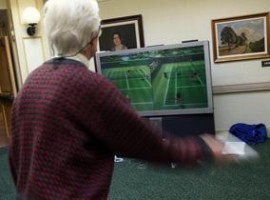Brain building made easy
March 17, 2009

At the Building Better Brain Health Fair at Carleton-Willard Village in Bedford, Marita Hartshorn, of Lexington, tries Wii tennis. The station was to show how exercise can prevent Alzheimer's. Ann Ringwoond/ Wicked Local staff photographer
Bedford Minuteman
By Chris Klingenberg/Staff Writer
Tue Mar 17, 2009, 01:05 PM EDT
BEDFORD, MASS. – It was the first fair on building better brain health in New England and it surely was memorable.
Carleton-Willard Village sponsored a community fair on Building Better Brain Health on Friday from 9 a.m. to 1 p.m. and the turnout was more than Director of Public Relations Stephanie Smith had expected.
“The amount of people here is unbelievable,” said Smith. “Carleton-Willard Village has a great partnership with the Boston University Alzheimer’s Disease Center and this was a great opportunity for the two groups to work together. Each time there is a talk about memory loss, there seems to be more interest so we came up with the idea to have a brain health fair.”
Dr. Robert Stern, co-director of the Alzheimer’s Disease Center at Boston University, was the keynote speaker. Stern talked about the latest research on preventing and treating memory loss disease.
“This is a very unique program going on,” said Stern. “In fact, it is the first that we know of in this region of the country. The Alzheimer’s Disease Center at Boston University is participating in this and helping to organize this event because our job here is to conduct research and provide education regarding Alzheimer’s Disease and other conditions affecting older Americans.”
The Alzheimer’s Disease Center at Boston University is one of the most well-known research centers in the U.S. on memory loss.
Boston University’s Recruitment and Educational Outreach Coordinator Stephanie Sikora was also instrumental in making the fair possible.
“There seems to be a growing response to people about wanting to maintain memory health,” said Sikora. “We have seen a lot more individuals come to us at an early age. Alzheimer’s disease at an early age is becoming more common, so it is important to increase awareness.”
Tables with information about caregiver’s support, heart and brain health, intellectual stimulation, nutrition, a skills assessment for elderly drives project, home safety, memory improvement, vision and AD, and a look at Carleton-Willard’s Alzheimer’s care services were all topics that were discussed at the fair.
“We want people to care about their memory,” said Sikora. “There are a lot of myths out there and we want to break down the walls and increase awareness about brain health.”
Eleanor Spinney, 89, has been living at Carleton-Willard Village since 1994.
“The handout on easy ways to achieve intellectual stimulation is very interesting,” said Spinney. “This tells us that we can improve our brain by doing ordinary things.”
Best Buy was also represented at the fair as workers demonstrated the Nintendo Wii system.
“I hope that people can gain an understanding about easy practical things that can be done for the brain,” said Smith. “There are things to do to keep the brain and memory strong and it is very important and needs to be taken seriously.”